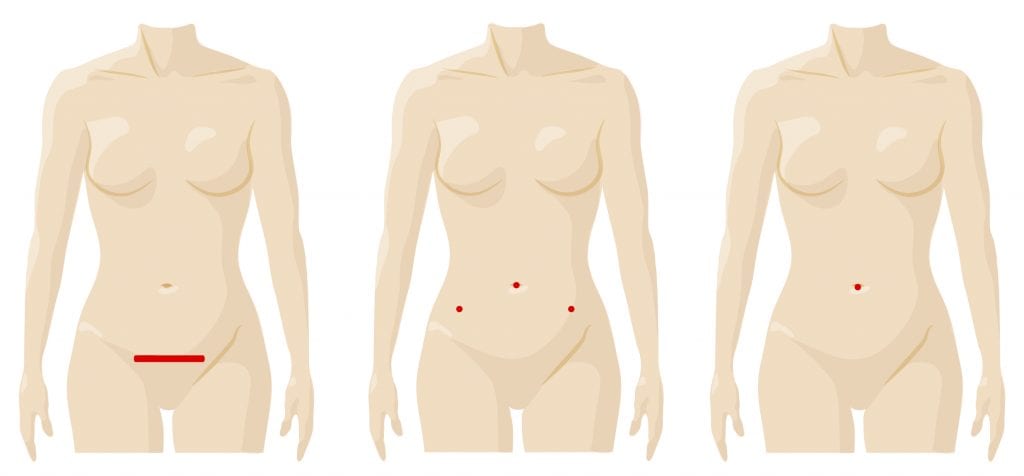Hysterectomy and Single-site® Hysterectomy
The Midwest Institute for Robotic Surgery is a leader in performing hysterectomies.
 We have performed more hysterectomies than any other hospital and surgery center in the Chicago Metropolitan area.
We have performed more hysterectomies than any other hospital and surgery center in the Chicago Metropolitan area.- Silver Cross was the first hospital in Illinois and one of only 15 hospitals in the U.S. to perform Single-Site® Hysterectomy through one tiny incision in the belly button.
- Physicians from around the world come to Silver Cross to observe Dr. Nahla Merhi and the surgical team perform this da Vinci ® Single-Site®Hysterectomy.
Conditions
Many benign (non-cancerous) conditions can affect a woman’s reproductive system, which includes the uterus, vagina, ovaries and fallopian tubes. Most of these conditions affect the uterus, which is the hollow, fist-sized organ that holds a baby during pregnancy.
Common benign conditions include:
- Fibroids which are growths in and/or around the uterus
- Endometriosis which occurs when your uterine lining grows outside the uterus
- Adenomyosis which occurs when your uterine lining grows into the wall of the uterus
- Pelvic prolapse which is the slipping of the uterus, vagina and/or bladder.
Gynecologic conditions can cause many different symptoms, or no symptoms. Some of the more common symptoms can include:
- Pelvic pain
- Heavy bleeding
- Irregular periods
- Fatigue
- Unusual bloating
- Pain during intercourse
- Infertility.
If your symptoms are severe, your doctor may recommend medicine, lifestyle changes or surgery.
A variety of gynecologic cancers can also affect your reproductive system. Gynecologic cancer is any cancer that starts in one of your reproductive organs. The most common types are:
- Cervical
- Endometrial (uterine)
- Ovarian cancer
Each gynecologic cancer is unique and can have many signs, symptoms and risk factors. It is important to get regular gynecologic exams since treatment is more effective when the cancer is found early. If you are facing gynecologic cancer, your doctor will recommend the best treatment plan for you based on the location and stage of the cancer, as well as your overall health.
Surgery
Surgical options will depend on your exact conditions, symptoms and overall health. Your doctor may suggest a hysterectomy (removal of the uterus and possibly ovaries and fallopian tubes). A hysterectomy is the second most common surgery among women in the United States. If your doctor recommends a hysterectomy, there are different ways to perform this procedure. All options should be discussed with your surgeon.
Abdominal Hysterectomy
Your surgeon removes your uterus through a large open incision. The incision must be large enough for his or her hands to fit inside your body and touch your organs.
Vaginal Hysterectomy
Surgery is performed through a cut in your vagina. The surgeon takes your uterus out through this incision and closes it with stitches.
Laparoscopic Hysterectomy
Your surgeon operates using long instruments inserted through a few small incisions in the abdomen. One of the instruments has a tiny camera at the end. The camera sends images to a video monitor in the operating room to guide doctors during the operation.
Robotic Hysterectomy
Using a da Vinci® robot, the surgeon makes a few small incisions – similar to traditional laparoscopy. The robot is designed to provide surgeons with enhanced capabilities, including high definition 3D vision and a magnified view. Your doctor controls the robot, which translates his or her hand movements into smaller, precise movements of tiny instruments inside your body. The robot cannot act on its own. Surgery is performed entirely by the surgeon.
Single-Site® Hysterectomy
Your hysterectomy can be done through a small incision (cut) in your belly button using the da Vinci® robot allowing for virtually scarless results and less post-operative pain. The surgery can be performed in about one hour and patients go home within 24 hours.
Silver Cross was one of the first hospitals in the entire country to offer Single-Site® Hysterectomy. Surgeons from around the country travel to Silver Cross to observe Dr. Nahla Merhi, co-director of the Center of Excellence for Minimally Invasive Gynecology, perform this unique procedure.

Abdominal Hysterectomy (left), Robotic Hysterectomy (center), Single-Site™ Hysterectomy (right)
Benefits of Robotic Surgery
Compared with traditional open surgery, robotic surgery requires significantly smaller incisions. The potential benefits for patients include:
- Reduced pain
- Lower risk of complications
- Minimal blood loss
- Less scarring
- Shorter hospital stay
- Fast recovery time
Talk to your doctor to decide if robotic surgery is right for you. As with any surgery, there are risks.
Surgeons
These experienced physicians have met rigorous criteria demonstrating excellent outcomes and high patient satisfaction.